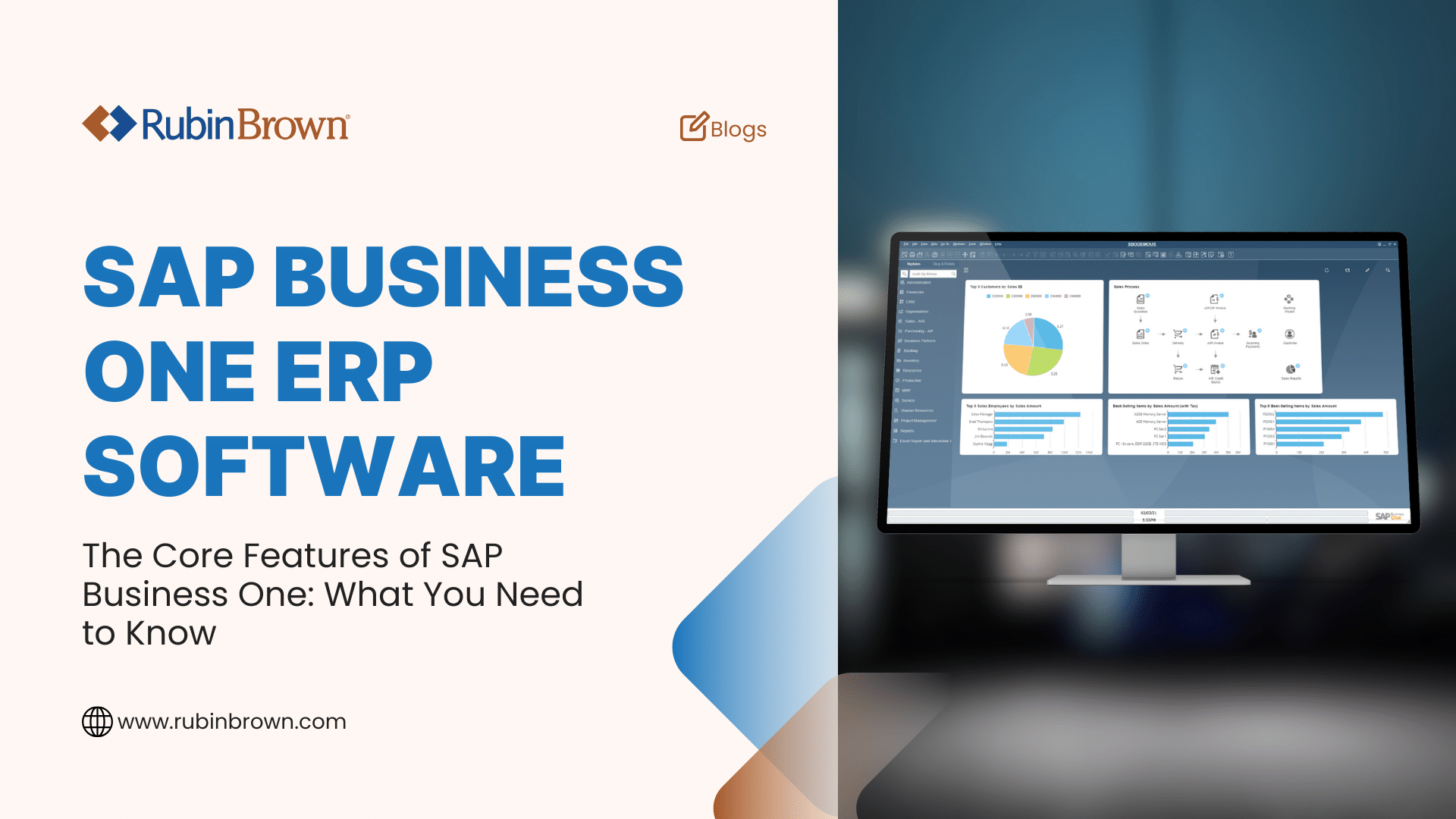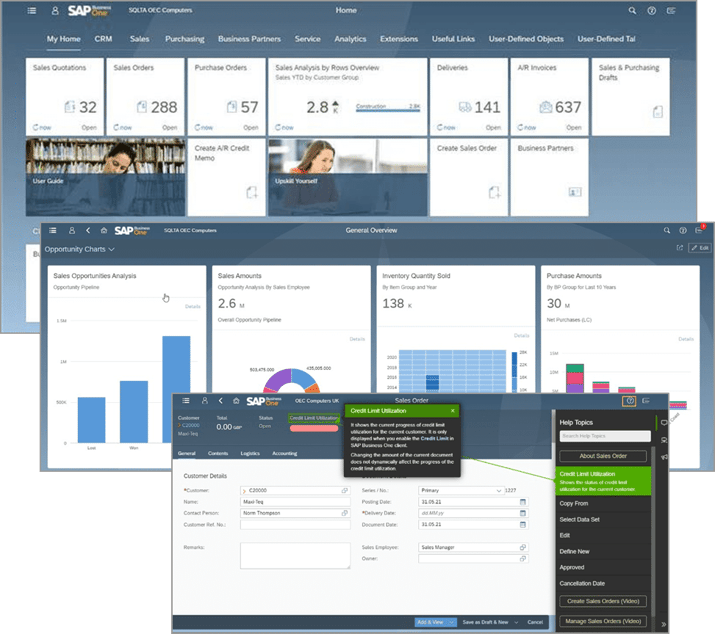1 min read
Hybrid ERP System Pros and Cons: What Smart Companies Know Before They Switch
How do companies modernize their ERP systems without disrupting core operations? That’s the critical question facing CIOs and CFOs who need both...

How do technology leaders tackle the challenge of implementing complex ERP solutions like SAP Business One in fast-evolving business environments? One key statistic to consider: 45% of SMBs view the integration of such systems as a significant hurdle in their digital transformation journeys. This paints a clear picture of the dilemma: striking the right balance between the advanced functionalities of ERP systems and the agility and scalability needs of growing businesses.
This blog aims to explore into the capabilities and various features of SAP Business One ERP, we will uncover its unique position in the market, its adaptability across various industries, and the robust partner ecosystem that supports and enhances its deployment. this blog will guide you through the essential factors to consider in choosing the right ERP solution for your business's unique needs and ambitions.

SAP Business One is a popular ERP solution primarily designed for small and medium-sized businesses (SMBs), developed by SAP SE. It automates and unifies critical business information & processes, covering areas like financial management, sales, customer management, inventory control, and analytics. It's main goal is to streamline operations, making it easier for SMBs to manage all facets of their business, from customer interactions to financials on a single platform, cutting down on the complexity of using multiple systems. When equipped with HANA in-memory storage it provides quick access to real-time data, enabling faster, informed decision-making. SAP Business One is also adaptable, supporting multiple currencies, languages, and localizations, making it ideal for global business operations.
It's a common misconception that SAP Business One is the same as the SAP system used by Fortune 500 companies. SAP Business One was not originally developed in-house at SAP. Instead, it began its journey as a product named "Optimum" developed by an Israeli company called TopManage Financial Systems. Founded in the late 1990s, TopManage focused on creating an affordable, yet comprehensive business management solution that could cater to the needs of small and medium-sized businesses. Optimum was designed to be user-friendly, flexible, and scalable, making it suitable for a wide range of industries and business models.
SAP Business One stands out as a comprehensive integrated enterprise resource planning (ERP) solution, tailor-made to cater to the distinct needs of small to medium-sized businesses (SMBs). This powerful ERP is designed to automate and streamline key business functions across the following areas:
Accounting: SAP Business One provides a comprehensive solution to streamline financial processes and automates accounting tasks while providing robust tools for cash flow management, asset tracking, budget control, and project cost monitoring. Additionally, the platform supports real-time financial reporting, providing in-depth analysis and strategic planning. Accounting end users cite SAP Business One is generally well-regarded for its financial management capabilities, with many users praising its functionality and ease of use.
CRM: The sales and customer management capabilities of SAP Business One are engineered to refine the entire sales cycle. This ranges from tracking leads and opportunities to managing sales orders and customer data. The end goal is to boost customer satisfaction through improved service and to elevate sales performance by leveraging insights from sales reports and dashboards.
Inventory Management: On the procurement and inventory front, SAP Business One aids businesses in enhancing their purchasing and inventory management practices. It offers functionalities for managing purchase orders, contracts, supplier relationships, and inventory levels. The system supports various inventory valuation methods and facilitates real-time inventory tracking, which is crucial for minimizing stock-outs and overstock scenarios.
BI: Embedded within SAP Business One are advanced business intelligence, analytics, and reporting tools. These convert data into actionable insights, allowing users to craft customized reports and dashboards to keep an eye on key performance indicators (KPIs). Such capabilities enable timely, data-driven decision-making across the organization.
Project Management: For those engaged in project and resource management, SAP Business One provides an array of tools to assist in planning, tracking, and managing projects and resources effectively. It allows for comprehensive project reports and analysis, which are vital for ensuring projects stay on track and within budget.
Manufacturing: SMB manufacturing firms will find SAP Business One particularly beneficial, thanks to its manufacturing and production planning features. These include production planning, bill of materials (BOM) management, and shop floor control functionalities. Such features are necessary for streamlining the manufacturing processes, boosting efficiency, and guaranteeing the timely delivery of products. End users cite that B1's manufacturing capabilities are a mixed bag, with some praising its robust functionality and others noting its limitations compared to more specialized manufacturing ERP systems. While the system is praised for its real-time visibility into key manufacturing metrics, inventory management, and quality control features, it is also described as having "light weight manufacturing functionalities" that may be better suited for small to medium-scale enterprises rather than large-scale manufacturing operations. Overall, SAP Business One offers a solid set of manufacturing management capabilities, but potential Business One customers should carefully evaluate whether its features align with their specific needs and the complexity of their manufacturing processes.
In our experience, SAP Business One stands out for its adaptability and comprehensive integration capabilities, making it a solid choice for a variety of industries. Let's dive into how SAP Business One aligns with different industry needs and when it might be less suitable.
For the Manufacturing Sector: For clients in manufacturing, particularly those navigating complex supply chains, find SAP Business One to be a pivotal tool. It aligns inventory management with production planning and sales, fostering operational efficiencies and enhancing control over production workflows. This collaboration is crucial for optimizing resource utilization and responding adeptly to market demands.
In Wholesale Distribution: Efficiency and precision in inventory and order management are critical for wholesale distributors. SAP Business One excels in refining these aspects, bolstering supply chain operations, and thereby elevating customer service levels. Our clients appreciate the system's ability to streamline operations, making them more responsive to market dynamics.
Retail Industry Insights: Retailers, encompassing both physical stores and e-commerce platforms, benefit significantly from the inventory and sales management features of SAP Business One. It provides deep insights into consumer behavior and inventory trends, enabling effective stock management and targeted promotional activities. Our retail clients report improved stock turnover and customer satisfaction as key outcomes.
Professional Services Firms: For our clients offering professional services, SAP Business One is invaluable for its project management, time tracking, and billing functionalities. These features offer transparency into project progress, budget alignment, and resource deployment, thereby enhancing decision-making processes and client rapport.
Food and Beverage Sector: Compliance, quality, and safety are non-negotiable in the food and beverage industry. SAP Business One supports our clients in this sector by managing critical aspects such as shelf life, batch tracking, and regulatory compliance, ensuring product integrity and consumer trust.
Considerations for Smaller Entities and Startups: It's worth noting that smaller businesses or startups might find the sophistication and investment in SAP Business One challenging. In these cases, we often recommend more basic solutions that align with their immediate needs and budget constraints.
Large Enterprises: For larger organizations with intricate operational needs, we might suggest more advanced ERP solutions like SAP S/4HANA, which offer enhanced scalability and analytical depth.
Specialized Industries: Businesses in highly specialized or niche markets may require ERP solutions tailored to their unique demands. In such scenarios, we explore industry-specific systems that offer customized functionalities.
Minimal Integration Requirements: Companies with limited integration needs or those predominantly operating with manual processes may not fully capitalize on the benefits of SAP Business One, impacting the return on their investment.
SAP Business One is well-regarded for its extensive functionality that covers essential business operations, including finance, sales, customer relationship management, inventory, and operations. Its tight integration between modules streamlines decision-making by minimizing the complexity of the IT and software environment and enhancing data accuracy provides management a single source of truth.
The user-friendly interface of SAP Business One is another bright spot, reducing the learning curve for new users. This ease of use contributes to higher organizational adoption rates and simplifies change management processes, making it an attractive option for businesses looking to implement an ERP system.
However, despite these benefits, users have identified several areas of concern with SAP Business One. One significant drawback is the limitations in certain modules, such as production and some financial aspects, which are perceived as less developed compared to other ERP systems within this category (e.g. NetSuite).
Another challenge is the availability of proficient support. Users have expressed difficulties in finding knowledgeable assistance, and there's a perception of insufficient investment from SAP in enhancing the system and supporting its user base. There is a prevailing perception that the majority of investment is directed towards ByDesign and S/4HANA within the SAP ecosystem.
The transition from other ERP systems to SAP Business One can also present many hurdles, particularly due to the reliance on add-ons for localizations. These add-ons are crucial for tailoring the system to specific business requirements, but they can be outdated or bug-ridden, leading to performance and integration issues.
For non-HANA instances of SAP Business One, processing speed has been reported as a bottleneck, affecting operational efficiency. While the scalability of SAP Business One with HANA is a significant advantage compared to other ERPs, the financial investment required for HANA is a important factor to consider. The costs associated with SAP Business One HANA can be prohibitive for smaller businesses.
These challenges highlight the need for careful consideration and planning when adopting SAP Business One, balancing its comprehensive functionality and user-friendly interface against the potential drawbacks and costs.
The SAP partner ecosystem is quite large, boasting over 25,500 partners worldwide, showcasing a robust and well-supported network by SAP. This ecosystem facilitated through the SAP PartnerEdge program, offering a diverse range of partner initiatives.
Within the SAP Business One ecosystem, partners play a crucial role in selling ERP licenses, hosting services, and providing implementation & support services.
While the presence of SAP Business One partners is more prominent outside the US than within, there are numerous highly capable Business One resellers available to provide integrations, implementations, and guidance in navigating the licensing process for SAP Business One.
The SAP Business One Professional license stands as the most comprehensive offering, designed for users who require full access to the platform's extensive capabilities. This includes not just the core features but also the flexibility to customize the software to meet specific business needs using the SAP Business One Software Development Kit (SDK).
The upfront cost for this perpetual license amounts to $3,213 per user, making it a substantial investment for businesses seeking a comprehensive solution. Moreover, to guarantee continuous access to updates and support, a mandatory 20% annual fee is applied based on the initial purchase price.
For those preferring a subscription based approach to licensing, the Professional license is available at $108 per user per month, which is inclusive of maintenance costs, providing a more predictable expense structure for businesses.
On the other hand, the Limited User license caters to users that have more focused needs, covering essential areas such as Customer Relationship Management (CRM), finances, and logistics. This option is more economically priced at $1,666 per user for an upfront purchase (perpetual), again with a 20% annual fee for updates and support to keep the software current and fully functional.
The subscription model for the Limited User license is priced at $56 per user per month, offering a lower entry point for businesses that need basic functionalities without the additional maintenance fees.
Both licensing options are designed with flexibility in mind, allowing businesses to choose a solution that best aligns with their operational requirements and budget constraints. The Professional license is ideal for businesses that demand the full spectrum of features and customization options, ensuring they can leverage the software to its fullest potential. Meanwhile, the Limited User license provides a cost-effective solution for users that need to manage critical aspects of their operations without the full suite of features.

Choosing the right Enterprise Resource Planning (ERP) solution is critical for a company's future growth, operations, and scalability. ERP advisory firms, such as RubinBrown's Business Advisory Services (BAS) team, offer invaluable expertise and an objective viewpoint that often surpasses vendor-provided insights. ERP selection firms possess deep experience across industries, guiding businesses with ERP solutions that align with your unique needs, industry requirements and business objectives.
One of the primary benefits of engaging with an ERP advisory firm is their unbiased analysis. They focus on finding the best fit for the client, without pushing a particular vendor's solution. Their expertise also plays a crucial role in risk mitigation, identifying potential issues early and recommending strategies to minimize them.
Collaborating with an ERP selection team can result in substantial cost savings by steering clear of ill-fitting systems, unnecessary modifications, and avoiding implementation pitfalls. Their strong negotiation abilities frequently secure more favorable pricing and terms from vendors, enhancing the overall value proposition for a new ERP system.
In summary, the decision to implement a new ERP system is too important to leave to chance. Partnering with an ERP evaluation team ensures expert advice, unbiased analysis, and strategic planning, making it an investment in your company's long-term success. Begin your ERP conversion journey with the team at RubinBrown today.

1 min read
How do companies modernize their ERP systems without disrupting core operations? That’s the critical question facing CIOs and CFOs who need both...

How often are you fighting fires instead of leading the project?
.png)
Sage Business Cloud Enterprise Management, previously known as Sage X3 ERP, stands at the forefront of innovation, offering medium to large...